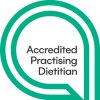I am often asked by young parents — where one or both have coeliac disease — if there is anything special that they need to consider when introducing gluten and wheat into their babies’ diet?
First degree relatives of someone with coeliac disease—this means their children, siblings or parents— have a 10-20% increased risk of also developing coeliac disease. These babies are considered to be more ‘at risk’ than others, of developing it. This is why, if one family member has coeliac disease, the relatives are encouraged to be tested.
Though not a requirement, some parents test their children for the coeliac genetic alleles, so they know if their child has inherited the risk for potentially developing coeliac disease or not. Please note that having the genes is NOT a diagnosis of coeliac disease. About 30-40% of people in the world have the genes associated with coeliac disease but only about 3 percent of those people actually go on to develop the disease.
Do note, that coeliac disease can also show up in families who have never heard of it before and know no-one in their family who has it.
Over the years, advice given to parents on how and when to introduce gluten to their ‘at risk’ baby, has been quite variable. Advice does change as our knowledge on the topic grows. Much of the old advice is no longer relevant. I will still include that advice below however, so if it is something you have heard being passed on by word of mouth through the circles you move in, you can now reference it as current or old advice and act accordingly.
OLD ADVICE that you may hear.
1970’s-1990’s
Don’t feed your baby gluten before age one…..disregard this advice
Prior to the year 2000, gluten was with-held from the ‘at risk’ babies’ diets until the age of one. This advice was NOT aimed at preventing the disease. It was aimed at keeping babies healthier, so they could grow and reach developmental mile-stones, before perhaps becoming ill and lethargic from the possible effects of gluten, and malabsorption of nutrients.
2000 to about 2015
Advice at this time was attempting to prevent the development of coeliac disease in children. Two main concepts dominated.
- Gluten containing foods needed to be introduced between the ages of 4-7 months. This was touted as the ‘window of opportunity’ for the immune system to get used to “seeing” gluten as a normal food component and not react.
- Gluten was to be introduced while the child was still being breast fed.
How did this advice come to be?
There was not a lot of specific research on this topic at that time, and this advice came mostly from one study. The advice seemed to suggest that less coeliac disease was being diagnosed in the first 1-2 years of life, in the group of children following these guidelines.
However, these same children continued to be followed up well into their teenage years. Several in the group went on to develop coeliac disease by the time they were 5 or older. The numbers with coeliac disease became the same as the control group. Over time this showed there was no lasting effect of those early diet changes when gluten was first introduced.
Unlike food allergy, where if you have not developed it in the first 2 years of life, chances are low that you will develop it later. Coeliac disease can develop at any age and therefore any stage of life.
Current Recommendations from 2016:
During the early part of this century there were more research studies done specifically looking at whether the development of coeliac disease could be influenced by the foods introduced in the first years of life.
Foremost conclusions—
- There are no guidelines which will prevent the development of coeliac disease.
- The studies show that the child’s genetics are more likely to determine whether or not they develop coeliac disease.
In 2016 the European Society for Paediatric Gastroenterology, Hepatology & Nutrition [ESPGHAN], produced the following guidelines based on these research studies.
- Prolonged breast feeding is a good general recommendation for all children but will not prevent the development of coeliac disease.
- Gluten foods should not be introduced before 4 months of age.
- The ‘at risk’ children can be introduced to wheat foods in the same manner and timing that is suggested for all children.
- To exclusively breast feed for the first 6 months and then introduce foods— is the current Australian recommendation.
- However, if your child is ready for solids earlier, then introduce foods from 4-6 months if led so by the child.
- Start with iron fortified rice cereals, pureed fruit and vegetables.
- Introduce pureed meat as breast milk is low in iron, and the babies own iron stores start to deplete at about 6 months.
- Then introduce other grains including regular oat porridge and wheat/gluten foods.
- It’s suggested to have small & not large quantities of wheat for some time after the first introduction, but no guidelines were given by ESGHAN defining ‘large’… or the time frame.
From 2019:
Trying to nail down gluten quantities:-
A study in 2019 concluded that more coeliac disease developed earlier in children eating larger quantities of gluten between 1-2 years of life. Again, the effect may just be while they are young, it may not mean they won’t go on to develop it later, as seen in previous studies.
If we extrapolate from this study it is wise to introduce the gluten, but then to cap the quantity at 2-3 slices of wheat bread equivalent choices a day, while under age 2, and use gluten free food the rest of the day.
Approximate 3 gluten serves in a day could be:
- A wheat sandwich (2 slices of bread) and 2 biscuits
- A wheat sandwich (2 slices of bread) and ½ cup wheat pasta
- 2/3 cup wheat cereal, ½ cup wheat noodles, 2 wheat biscuits
Don’t count regular oats as a gluten containing food, there is very little gluten in them when you are comparing intakes with slices of wheat bread.
The dominating thoughts appear to be that the childs’ genetics are more likely to drive the disease, not the foods eaten. Reducing gluten in the younger years may prevent early development of the disease, but is not protective over a life-span. Genetics plus an environmental trigger, that can occur at any age, leads to the development of coeliac disease.
Generalised advice:
As always this is a generalised summary of the research and is not specific advice to any particular person. Please discuss your concerns and situation with your health care team and take their advice and direction for your circumstances and that of your family.
Posted March 2024
Dr. Kim Faulkner-Hogg
Gluten Free Nutrition
Picture taken by Harry Grout, on Unsplash



